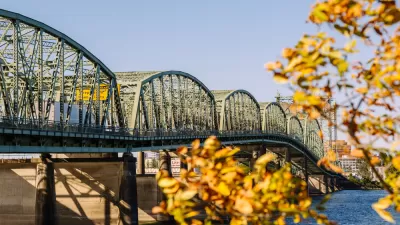Efforts by local leaders to revive a $3.4 billion plan to replace the bridge linking Portland, Oregon to Vancouver, Washington is just the latest example of a trend in metropolitan innovation in the face of federal and state gridlock.
"[A]fter more than 20 years and tens of millions of dollars’ worth of studies, [the Columbia River Crossing plan] was killed last month by the Washington State Senate after the Republican-dominated majority coalition declined to vote on financing it," writes Kirk Johnson. "The governors of Oregon and Washington, both Democrats, immediately ordered further planning work halted."
"Then, almost without missing a beat, local leaders picked up the ball. If political paralysis in Olympia, the capital of Washington, had killed the old proposal, they said, then cooperation on the ground, by people who have witnessed the region’s transportation changes firsthand, would find the way."
"There is a pattern in this, reflected across the nation, say planners, economists and academics: cities are taking the lead," explains Johnson. "As recession and government downsizing have squeezed federal and state options, and partisan stalemate politics have crippled some state capitals, local leaders have pushed the front lines of change, if only by necessity."
FULL STORY: Washington and Oregon Cities Try to Evade Political Jam to Build a Bridge

Planetizen Federal Action Tracker
A weekly monitor of how Trump’s orders and actions are impacting planners and planning in America.

Map: Where Senate Republicans Want to Sell Your Public Lands
For public land advocates, the Senate Republicans’ proposal to sell millions of acres of public land in the West is “the biggest fight of their careers.”

Restaurant Patios Were a Pandemic Win — Why Were They so Hard to Keep?
Social distancing requirements and changes in travel patterns prompted cities to pilot new uses for street and sidewalk space. Then it got complicated.

Platform Pilsner: Vancouver Transit Agency Releases... a Beer?
TransLink will receive a portion of every sale of the four-pack.

Toronto Weighs Cheaper Transit, Parking Hikes for Major Events
Special event rates would take effect during large festivals, sports games and concerts to ‘discourage driving, manage congestion and free up space for transit.”

Berlin to Consider Car-Free Zone Larger Than Manhattan
The area bound by the 22-mile Ringbahn would still allow 12 uses of a private automobile per year per person, and several other exemptions.
Urban Design for Planners 1: Software Tools
This six-course series explores essential urban design concepts using open source software and equips planners with the tools they need to participate fully in the urban design process.
Planning for Universal Design
Learn the tools for implementing Universal Design in planning regulations.
Heyer Gruel & Associates PA
JM Goldson LLC
Custer County Colorado
City of Camden Redevelopment Agency
City of Astoria
Transportation Research & Education Center (TREC) at Portland State University
Camden Redevelopment Agency
City of Claremont
Municipality of Princeton (NJ)



























